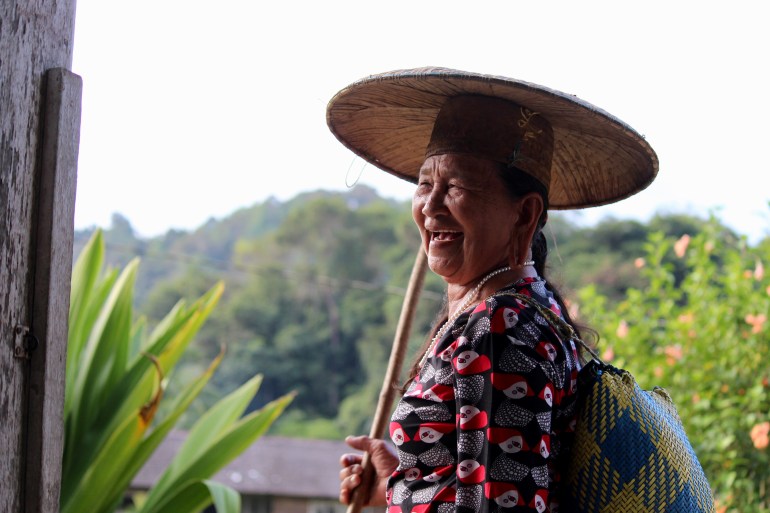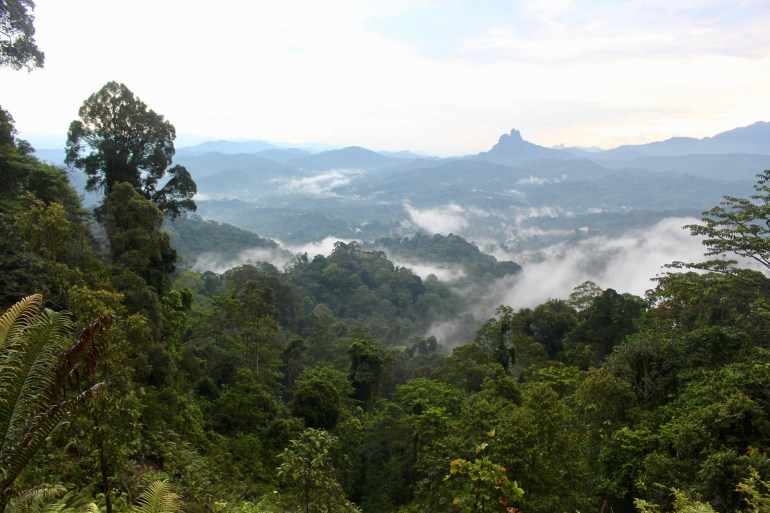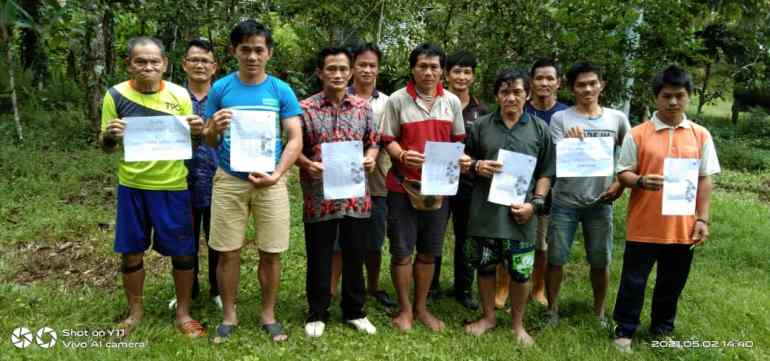Malaysia Indigenous communities ‘hopeful’ on logging dispute
Some 36 groups bring complaint about logging in the remote Baram and Limbang regions of Sarawak.

Indigenous peoples from the Malaysian state of Sarawak on the island of Borneo are hopeful their objections to logging by Samling Group – covering an area of forest roughly equivalent to the size of Luxembourg – are finally being taken seriously after the country’s timber certification board ordered dispute mediation a year after they first complained about the plan.
The Malaysian Timber Certification Council (MTCC) took action following complaints by 36 Indigenous Penan, Kenyah and Jamok communities from Sarawak’s Upper Limbang and Baram regions about alleged flaws in its certification of two logging concessions.
Keep reading
list of 4 items‘Enough is enough. We want the trees to grow back’
‘Real tensions’: Malaysia’s oil-rich Borneo states flex muscles
A Time to Swim: A Story of Resistance in the Forests of Borneo
The dispute relates to two logging concessions in two Forest Management Units (FMUs): the 148,305-hectare (366,469-acre) Gerenai FMU, located in Upper Baram and the 117,941-hectare (292,438-acre) Ravenscourt FMU located in Upper Limbang.
News of the dispute resolution process came at a time when communities say they have received letters from Samling allegedly threatening them with legal action for speaking out about their concerns.
The communities name Samling, one of Malaysia’s biggest logging companies, and the Selangor-based testing, inspection and certification firm SIRIM QAS International as parties to the dispute. SIRIM QAS was hired by Samling to conduct audits of the areas before the MTCC certification was granted. Both parties have until July 15 to respond to the complaints, after which the council will deliberate on its findings and announce its decision.
The MTCC is endorsed by the Programme for the Endorsement of Forest Certification (PEFC), a leading international forest certification body, which was also sent copies of the complaints, as were the Sarawak Forest Department and Malaysia’s National Human Rights Commission (SUHAKAM).
“In my opinion, that’s the right approach to take by MTCC,” Penan leader Komeok Joe, who heads up the Penan advocacy group Keruan and helped the Penan communities in Upper Limbang to file their complaint told Al Jazeera.
“The communities involved are very hopeful that MTCC will make the right decision, as they have been responsive to other communities before. We call for the release of all relevant documents on Samling’s timber operations, for proper consultation procedures and for the recognition of the importance of the forest for their livelihoods, health and wellbeing.”

The thousands of Indigenous people who live in northern Limbang and Baram districts rely on the forest for their physical and cultural wellbeing, while the Baram River is the state’s second-largest. The regions are also home to critically endangered species including gibbons, sun bears and hornbills, which are also at risk from the logging plans.
Question of consent
Last year, community members from Baram and Limbang told Al Jazeera that while logging of their areas by Samling had been certified by the MTCC as “sustainable”, they had not given their free, prior and informed consent to any logging activities because they had not been adequately consulted and had no access to the social and environmental impact assessments the company had submitted.
In their complaints, filed in May, communities highlighted the discrepancies between the timber council’s certification and its on-the-ground implementation. They also noted a lack of transparency, Samling’s failure to properly consult the communities about the logging, and their alleged disregard not only of Indigenous people’s dependence on forest resources, but also community initiatives for forest conservation.
In an emailed response to Al Jazeera’s questions, Samling said it had “repeatedly addressed these baseless allegations”, which it said had “affected and tarnished” the company’s reputation.
It added that it had initiated legal proceedings against Save Rivers, a non-profit organisation working in the area.
“In the circumstances, we trust you will appreciate that we are not at liberty to comment further on matters or issues in relation to the pending proceedings, including the Malaysian Timber Certification Council (MTCC) dispute resolution process,” Tzee Ling Tia, Samling’s head of sustainability, said in the email. “Samling maintains that it has adhered to all conditions and requirements imposed by the MTCC scheme.”
The Indigenous communities also highlighted flaws in MTCC’s complaint mechanism.
“At the core of the issue lies a lack of understanding by Samling about what free, prior and consent means,” the complaints – seen by Al Jazeera – alleged. “Engaging with a few select people from the community is not the same thing as consulting the community about what community really wants.
“While Samling is certifying their timber extraction, many communities within the FMU have a different vision for their territories: they want to protect their forests for future generations, livelihoods, wildlife and ecotourism.”

In Upper Baram for example, Kenyah Jamok and Penan communities have been working to establish the Baram Peace Park (also known as the Upper Baram Forest Area) – a community-led initiative designed to protect Sarawak’s last tracts of primary forest, celebrate local cultures and develop sustainable livelihoods.
The idea of an Indigenous-led rainforest park was born from decades-long struggles against logging and the exploitation of natural resources and rooted in the wisdom and knowledge passed down through generations of people who see themselves as the custodians of the forest.
First initiated by communities in 2009, the proposal was backed by local and international NGOs and later adopted by the Sarawak Forest Department.
The proposed park covers a whopping 283,500 hectares (700,543 acres) and is located deep in Sarawak’s interior, close to the Indonesian border – between the Transboundary Biodiversity Conservation Area of the state’s Pulong Tau National Park and the Kayan Mentarang National Park in neighbouring East Kalimantan.
In 2020, the Malaysian government formally submitted a proposal for the park to the International Tropical Timber Council (ITTO), which officially endorsed it and is now looking for funding from its member countries.
Opposed to logging
Despite this landmark step, communities affected by the Gerenai FMU say that Samling’s logging concession overlaps with their proposed forest park and disregards the community’s right to manage their forest.

In Upper Limbang, Penan communities affected by the Ravenscourt FMU are among some of the last Penan to have settled and many still maintain semi-nomadic lifestyles, making their dependency on the forest even more significant.
“Within the Ravenscourt FMU and its close vicinity live some of the Penan groups that pursued their nomadic livelihoods until quite recently and today are only semi-settled, spending vast amounts of time in the forest, hunting, fishing and gathering.
“Their dependency on forest resources is therefore even higher than an average indigenous community in Sarawak, and they have been strong opponents against logging dating back to the 1980s,” they said in their complaint, which was drafted with the help of Komeok Joe and the Penan advocacy group Keruan.
“As long as the company cuts down the forest, we do not agree,” said Penan Headman Peng Megut from Long Tevenga in Upper Limbang.
Indigenous rights activists and environmental campaigners, who are working closely with the affected communities, are calling for a temporary moratorium on logging in both concessions while the dispute resolution process is under way and for the release of key social and environmental impact assessment reports.
Jettie Word, executive director of the California-based Borneo Project, which brings international attention and support to community-led efforts to defend forests, sustainable livelihoods and human rights, said her organisation has been supporting communities affected by the Gerenai and Ravenscourt FMUs and helping to establish the Baram Peace Park.
“We’re pleased that MTCC understands the gravity of the situation enough to open a dispute resolution process, however, the larger question is whether Samling and SIRIM will be held to acceptable standards, or whether the act of simply checking boxes – as opposed to properly conducting free, prior and informed consent – is good enough for these Malaysian entities,” Word said.
She also pointed to the struggles that the communities faced in trying to file an official complaint with the MTCC.
The communities affected are remote and to reach Upper Baram or Limbang requires an arduous journey from the nearest city of Miri on unforgiving dirt tracks. From Miri to the nearest edge of the Gerenai concession takes four to five hours, while to reach the Ravenscourt base camp requires an internal flight from Miri to the town of Lawas and a further five to six hours by 4X4. Once at the villages, there is limited access to healthcare, electricity and other basic amenities.
In Upper Baram and Limbang, drafting of the complaints and collecting community feedback was conducted by community representatives and local advocacy groups.
“The complaint mechanism has been tricky to figure out even for organisations and people with reliable access to the internet and email – how could people living in the interior, without access to these tools, be expected to understand the complaint mechanism?
“It’s a big undertaking, and an impossible task to complete in the ulu (rainforest)” Word said.
